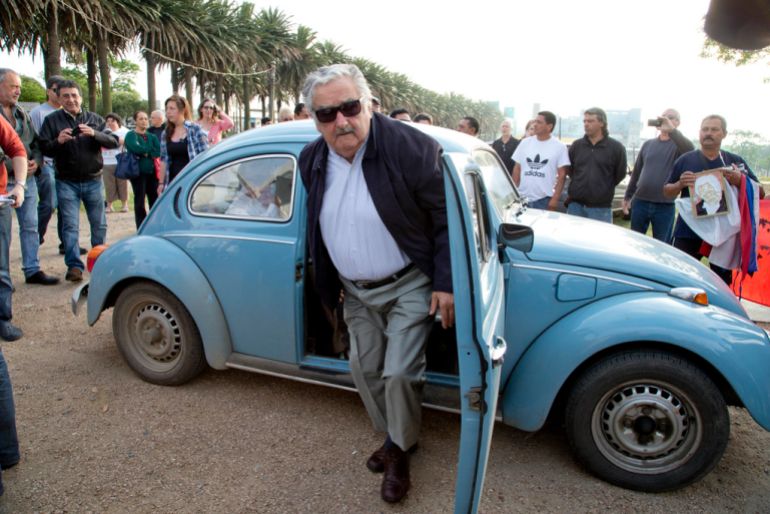Jose “Pepe” Mujica, a former leftist rebel who became Uruguay’s president from 2010 to 2015, has died at the age of 89.
Uruguayan President Yamandu Orsi announced his death in a social media post on Tuesday. Mujica had been diagnosed with throat cancer in 2024.
“It is with deep sorrow that we announce the death of our comrade Pepe Mujica,” Orsi wrote. “Thank you for everything you gave us and for your deep love for your people.”
Mujica became an icon even beyond Uruguay’s borders, as he led his country to pursue environmental reforms, legalise same-sex marriage and loosen restrictions on marijuana.
He also was celebrated for maintaining his simple lifestyle even during his presidency, when he eschewed the presidential palace in favour of the farmhouse where he grew flowers. He told Al Jazeera in 2022 that such opulence can “divorce” presidents from their people.
“I believe that politicians should live like the majority of their people, not like how the privileged minority lives,” Mujica explained.
News of Mujica’s death has been met with tributes from around the world, particularly from figures on the Latin American left.
“We deeply regret the passing of our beloved Pepe Mujica, an example to Latin America and the entire world for his wisdom, foresight, and simplicity,” Mexico’s President Claudia Sheinbaum wrote on social media.
Chile’s President Gabriel Boric, meanwhile, remembered Mujica’s optimism in a post of his own.
“If you left us anything, it was the unquenchable hope that things can be done better,” he wrote.
For his part, Colombian President Gustavo Petro offered a tribute to Mujica that doubled as a call for greater collaboration and integration across Latin America.
“Goodbye, friend,” Petro wrote in the wake of Mujica’s passing, as he envisioned a more unified region. “I hope that Latin America will one day have an anthem.”
Mujica became a symbol to a generation of political leaders helping to steer their countries out of military dictatorships during the latter half of the 20th century. Like Petro, Mujica was likewise a former rebel fighter.
As a young man in the 1960s, he led armed fighters as part of the far-left Tupamaros movement, which was known for robbing banks, taking over towns and even exchanging gunfire with local police.
Mujica was arrested multiple times and spent nearly a decade in solitary confinement, in a prison where he endured torture.
A government crackdown on the left-wing fighters helped pave the way for a coup in 1973, followed by a brutal military dictatorship that perpetrated human rights abuses like forced disappearances. But in 1985, Uruguay began its transition to democracy, and Mujica and other rebel fighters were released under an amnesty law.
He started to become a force in Uruguay’s politics, joining the Frente Amplio or Broad Front, a centre-left coalition with other former fighters.
After he was elected president at age 74, Mujica staked out progressive stances on civil liberties and social issues including abortion and gay marriage, and he even pushed for the legalisation of marijuana. He also emphasised the development of green energy practices, putting Uruguay at the forefront of addressing the climate crisis.
His long-term partner Lucia Topolansky, whom he met during his time with the Tupamaros, was also politically active, and she served as his vice president after they were married in 2005.
While president, Mujica famously shunned the presidential residence and remained at his flower farm on the outskirts of the capital of Montevideo. He also drove a weathered blue Volkswagen Beetle, one of his trademarks. His modest lifestyle led some to dub him the “world’s poorest president”.
“We elect a president, and it’s as if they’re a candidate to be king, someone with a court, a red carpet, who has to live in a fancy palace,” he told Al Jazeera in 2022, before adding with characteristic bluntness: “Don’t blame the pig, but those who scratch his back.”
Mujica remained a prominent public figure even after leaving the presidency, attending the inauguration of political leaders across Latin America and offering support to candidates in Uruguay, among them Orsi, who was elected in 2024.
“The problem is that the world is run by old people, who forget what they were like when they were young,” Mujica said during a 2024 interview with the news agency Reuters.
Mujica was informed in September 2024 that radiation treatment had effectively targeted cancer of the esophagus, but a doctor reported in January 2025 that the cancer had returned and spread to his liver.
The former rebel and president did not seem overly concerned.
“Honestly, I’m dying,” Mujica told the weekly magazine Busqueda in what he said would be his last interview. “A warrior has the right to rest.”
